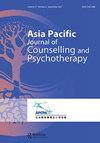A confirmatory factor analysis of the Mandarin-Chinese version of the Barrett-Lennard Relationship Inventory
IF 0.5
4区 心理学
Q4 PSYCHOLOGY, CLINICAL
Asia Pacific Journal of Counselling and Psychotherapy
Pub Date : 2018-01-02
DOI:10.1080/21507686.2017.1419269
引用次数: 4
Abstract
ABSTRACT The aim of this study was to translate and provide an initial validation for a full Mandarin-Chinese version of the Barrett-Lennard Relationship Inventory (B-L RI:MC) to include forms Other toward Self-64 (OS-64) and Other toward Self-40 (OS-40) for use in the Mandarin-Chinese research and clinical contexts. B-L RI:MC OS-64 was translated by a bilingual panel and subsequently administered to 658 Mandarin-speaking Taiwanese respondents online using an age-stratified random sampling strategy. Through both the factor analytic strategy of principle component analysis (PCA) and confirmatory factor analysis (CFA), the reliability and construct validity were investigated. The final results support the original four subscale dimensionality of the inventory. B-L RI:MC OS-64 showed Cronbach’s alpha was .96 and KMO = .97. PCA using Varimax rotation yielded a four-factor model supporting the sub-scales: level of regard, empathic understanding, unconditionality of regard and congruence, which explained 49.911% squared loading of the total variance. B-L RI:MC OS-64 and OS-40 were supported by the structures in CFA, which displayed NFI = .95 and .95, CFI = .97 and .96, IFI = .97 and .96, and RMSEA = .092 and .091, indicating a promising construct validity. In conclusion B-L RI:MC OS-64 and OS-40 versions can be considered appropriate for measuring the Rogerian therapeutic relationship conditions within a Mandarin speaking community.中英文版巴雷-伦纳德关系量表的验证性因子分析
摘要:本研究的目的是翻译并初步验证完整的中英文版巴雷特-伦纳德关系量表(B-L RI:MC),其中包括其他向自我64 (OS-64)和其他向自我40 (OS-40)表格,用于中英文研究和临床背景。B-L RI:MC OS-64由双语小组翻译,随后使用年龄分层随机抽样策略对658名说普通话的台湾受访者进行在线调查。通过主成分分析(PCA)和验证性因子分析(CFA)的因子分析策略,对其信度和结构效度进行了研究。最终结果支持原始的四个子尺度维度。B-L RI:MC OS-64显示Cronbach 's alpha = 0.96, KMO = 0.97。采用Varimax旋转法的主成分分析得到了支持关注水平、共情理解、关注无条件性和一致性的四因子模型,解释了总方差的49.911%的平方负荷。B-L RI:MC OS-64和OS-40被CFA结构支持,NFI值分别为0.95和0.95,CFI值分别为0.97和0.96,IFI值分别为0.97和0.96,RMSEA值分别为0.092和0.091,表明结构效度良好。综上所述,B-L RI:MC OS-64和OS-40版本可被认为适用于衡量华语社区的罗氏治疗关系状况。
本文章由计算机程序翻译,如有差异,请以英文原文为准。
求助全文
约1分钟内获得全文
求助全文

 求助内容:
求助内容: 应助结果提醒方式:
应助结果提醒方式:


